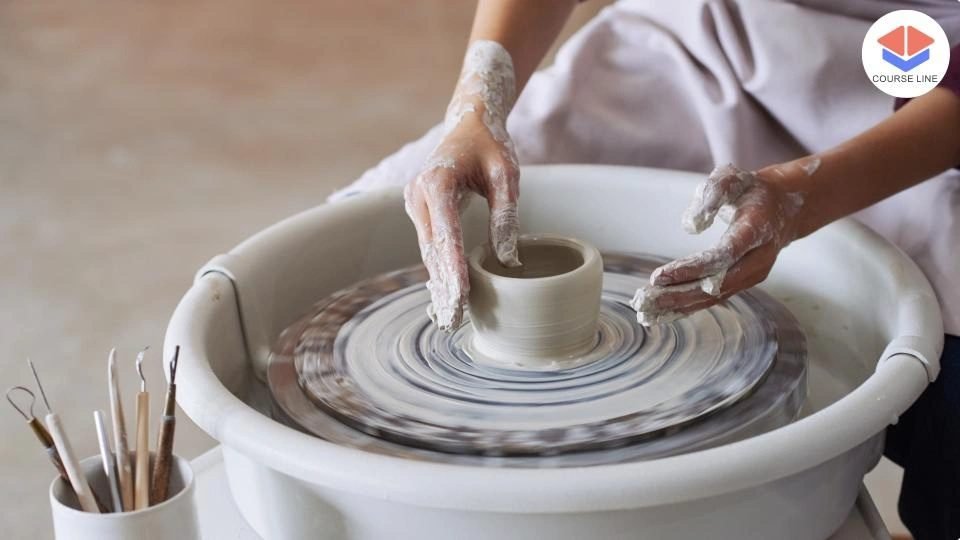Course Features
Price
Study Method
Online | Self-paced
Course Format
Reading Material - PDF, article
Duration
4 hours, 35 minutes
Qualification
No formal qualification
Certificate
At completion
Additional info
Coming soon
- Share
Overview
Ceramic engineering plays a pivotal role in developing advanced materials for industries ranging from construction and aerospace to electronics and energy. The Ceramic Engineering Level 3 Advanced Diploma offers a comprehensive and accessible pathway into this innovative field, covering everything from raw materials and manufacturing processes to testing, quality control, and environmental considerations.
The course begins by introducing learners to the fundamentals of ceramic materials, exploring their historical development and their diverse applications in modern industry. Students gain an appreciation for the importance of ceramics in both traditional uses—such as tiles and bricks—and cutting-edge technologies like aerospace components and electronic devices.
As learners progress, they explore the unique structural, thermal, electrical, and mechanical properties that define ceramic materials. This section equips students with a scientific understanding of what makes ceramics suitable for high-performance environments and how to evaluate their suitability for specific applications. The course also details the manufacturing processes involved in shaping and treating ceramic materials, including sintering, firing, and the selection of raw inputs.
Advanced modules cover emerging technologies in ceramic engineering, such as surface treatments, coatings, and additive manufacturing techniques, providing insight into the future direction of the industry. Learners also explore key applications of ceramics across multiple sectors, including construction, automotive, aerospace, energy, and electronics, gaining a well-rounded perspective on the value of ceramic materials in modern engineering solutions.
To ensure quality and performance, the course includes detailed instruction on quality control methods and mechanical testing techniques, along with approaches to failure analysis and problem-solving in ceramic manufacturing. These skills are essential for maintaining safety and durability in real-world applications. The programme concludes with a focus on sustainability, ethical practices, and future trends shaping the ceramic engineering landscape, encouraging learners to consider their role in driving responsible innovation.
This Level 3 diploma serves as a stepping stone into the ceramic materials industry, providing both foundational knowledge and practical context for further academic study or professional growth in engineering, manufacturing, or material science.
Who is this course for?
Ceramic engineering plays a pivotal role in developing advanced materials for industries ranging from construction and aerospace to electronics and energy. The Ceramic Engineering Level 3 Advanced Diploma offers a comprehensive and accessible pathway into this innovative field, covering everything from raw materials and manufacturing processes to testing, quality control, and environmental considerations.
The course begins by introducing learners to the fundamentals of ceramic materials, exploring their historical development and their diverse applications in modern industry. Students gain an appreciation for the importance of ceramics in both traditional uses—such as tiles and bricks—and cutting-edge technologies like aerospace components and electronic devices.
As learners progress, they explore the unique structural, thermal, electrical, and mechanical properties that define ceramic materials. This section equips students with a scientific understanding of what makes ceramics suitable for high-performance environments and how to evaluate their suitability for specific applications. The course also details the manufacturing processes involved in shaping and treating ceramic materials, including sintering, firing, and the selection of raw inputs.
Advanced modules cover emerging technologies in ceramic engineering, such as surface treatments, coatings, and additive manufacturing techniques, providing insight into the future direction of the industry. Learners also explore key applications of ceramics across multiple sectors, including construction, automotive, aerospace, energy, and electronics, gaining a well-rounded perspective on the value of ceramic materials in modern engineering solutions.
To ensure quality and performance, the course includes detailed instruction on quality control methods and mechanical testing techniques, along with approaches to failure analysis and problem-solving in ceramic manufacturing. These skills are essential for maintaining safety and durability in real-world applications. The programme concludes with a focus on sustainability, ethical practices, and future trends shaping the ceramic engineering landscape, encouraging learners to consider their role in driving responsible innovation.
This Level 3 diploma serves as a stepping stone into the ceramic materials industry, providing both foundational knowledge and practical context for further academic study or professional growth in engineering, manufacturing, or material science.
Requirements
Ceramic engineering plays a pivotal role in developing advanced materials for industries ranging from construction and aerospace to electronics and energy. The Ceramic Engineering Level 3 Advanced Diploma offers a comprehensive and accessible pathway into this innovative field, covering everything from raw materials and manufacturing processes to testing, quality control, and environmental considerations.
The course begins by introducing learners to the fundamentals of ceramic materials, exploring their historical development and their diverse applications in modern industry. Students gain an appreciation for the importance of ceramics in both traditional uses—such as tiles and bricks—and cutting-edge technologies like aerospace components and electronic devices.
As learners progress, they explore the unique structural, thermal, electrical, and mechanical properties that define ceramic materials. This section equips students with a scientific understanding of what makes ceramics suitable for high-performance environments and how to evaluate their suitability for specific applications. The course also details the manufacturing processes involved in shaping and treating ceramic materials, including sintering, firing, and the selection of raw inputs.
Advanced modules cover emerging technologies in ceramic engineering, such as surface treatments, coatings, and additive manufacturing techniques, providing insight into the future direction of the industry. Learners also explore key applications of ceramics across multiple sectors, including construction, automotive, aerospace, energy, and electronics, gaining a well-rounded perspective on the value of ceramic materials in modern engineering solutions.
To ensure quality and performance, the course includes detailed instruction on quality control methods and mechanical testing techniques, along with approaches to failure analysis and problem-solving in ceramic manufacturing. These skills are essential for maintaining safety and durability in real-world applications. The programme concludes with a focus on sustainability, ethical practices, and future trends shaping the ceramic engineering landscape, encouraging learners to consider their role in driving responsible innovation.
This Level 3 diploma serves as a stepping stone into the ceramic materials industry, providing both foundational knowledge and practical context for further academic study or professional growth in engineering, manufacturing, or material science.
Career path
Ceramic engineering plays a pivotal role in developing advanced materials for industries ranging from construction and aerospace to electronics and energy. The Ceramic Engineering Level 3 Advanced Diploma offers a comprehensive and accessible pathway into this innovative field, covering everything from raw materials and manufacturing processes to testing, quality control, and environmental considerations.
The course begins by introducing learners to the fundamentals of ceramic materials, exploring their historical development and their diverse applications in modern industry. Students gain an appreciation for the importance of ceramics in both traditional uses—such as tiles and bricks—and cutting-edge technologies like aerospace components and electronic devices.
As learners progress, they explore the unique structural, thermal, electrical, and mechanical properties that define ceramic materials. This section equips students with a scientific understanding of what makes ceramics suitable for high-performance environments and how to evaluate their suitability for specific applications. The course also details the manufacturing processes involved in shaping and treating ceramic materials, including sintering, firing, and the selection of raw inputs.
Advanced modules cover emerging technologies in ceramic engineering, such as surface treatments, coatings, and additive manufacturing techniques, providing insight into the future direction of the industry. Learners also explore key applications of ceramics across multiple sectors, including construction, automotive, aerospace, energy, and electronics, gaining a well-rounded perspective on the value of ceramic materials in modern engineering solutions.
To ensure quality and performance, the course includes detailed instruction on quality control methods and mechanical testing techniques, along with approaches to failure analysis and problem-solving in ceramic manufacturing. These skills are essential for maintaining safety and durability in real-world applications. The programme concludes with a focus on sustainability, ethical practices, and future trends shaping the ceramic engineering landscape, encouraging learners to consider their role in driving responsible innovation.
This Level 3 diploma serves as a stepping stone into the ceramic materials industry, providing both foundational knowledge and practical context for further academic study or professional growth in engineering, manufacturing, or material science.
-
- Introduction to Ceramic Materials 00:10:00
- Historical Development of Ceramics 00:10:00
- Applications of Ceramic Materials 00:10:00
-
- Structural Properties of Ceramics 00:10:00
- Thermal and Electrical Properties 00:10:00
- Mechanical Properties of Ceramics 00:10:00
- Raw Materials for Ceramics 00:10:00
- Ceramic Shaping Techniques 00:10:00
- Firing and Sintering of Ceramics 00:10:00
- Ceramics in Construction and Building Materials 00:10:00
- Ceramics in the Automotive and Aerospace Industry 00:10:00
- Ceramics in Electronics and Energy 00:10:00
- Sustainability in Ceramic Production 00:10:00
- Ethical Considerations in Ceramic Engineering 00:10:00
- Future Trends in Ceramic Engineering 00:10:00
- Premium Certificate 00:15:00

No Reviews found for this course.
Is this certificate recognized?
Yes, our premium certificate and transcript are widely recognized and accepted by embassies worldwide, particularly by the UK embassy. This adds credibility to your qualification and enhances its value for professional and academic purposes.
I am a beginner. Is this course suitable for me?
Yes, this course is designed for learners of all levels, including beginners. The content is structured to provide step-by-step guidance, ensuring that even those with no prior experience can follow along and gain valuable knowledge.
I am a professional. Is this course suitable for me?
Yes, professionals will also benefit from this course. It covers advanced concepts, practical applications, and industry insights that can help enhance existing skills and knowledge. Whether you are looking to refine your expertise or expand your qualifications, this course provides valuable learning.
Does this course have an expiry date?
No, you have lifetime access to the course. Once enrolled, you can revisit the materials at any time as long as the course remains available. Additionally, we regularly update our content to ensure it stays relevant and up to date.
How do I claim my free certificate?
I trust you’re in good health. Your free certificate can be located in the Achievement section. The option to purchase a CPD certificate is available but entirely optional, and you may choose to skip it. Please be aware that it’s crucial to click the “Complete” button to ensure the certificate is generated, as this process is entirely automated.
Does this course have assessments and assignments?
Yes, the course includes both assessments and assignments. Your final marks will be determined by a combination of 20% from assignments and 80% from assessments. These evaluations are designed to test your understanding and ensure you have grasped the key concepts effectively.
Is this course accredited?
We are a recognized course provider with CPD, UKRLP, and AOHT membership. The logos of these accreditation bodies will be featured on your premium certificate and transcript, ensuring credibility and professional recognition.
Will I receive a certificate upon completion?
Yes, you will receive a free digital certificate automatically once you complete the course. If you would like a premium CPD-accredited certificate, either in digital or physical format, you can upgrade for a small fee.
Course Features
Price
Study Method
Online | Self-paced
Course Format
Reading Material - PDF, article
Duration
4 hours, 35 minutes
Qualification
No formal qualification
Certificate
At completion
Additional info
Coming soon
- Share
Childminding Level 8 Advanced Diploma
Course Line239£490.00Original price was: £490.00.£14.99Current price is: £14.99.Trinity Classical Guitar Grades 1–3: Performance Prep & Musicality
Course Line237£490.00Original price was: £490.00.£14.99Current price is: £14.99.Guide Dog Trainer Level 3 Advanced Diploma
Course Line237£490.00Original price was: £490.00.£14.99Current price is: £14.99.





